
We’ll take a closer look at 10 pre-workout drinks that will keep your body refreshed:
What you drink before a workout can affect your energy and stamina, mental and physical performance, blood flow and body temperature regulation. Starting a workout properly hydrated can help reduce your risk of injury and how well your body recovers after exercise.
A report found that pre-workouts, known as multi-ingredient pre-workout supplements (MIPS), appear to be generally safe. Yet most studies have only evaluated short-term use (less than eight weeks), and researchers have concluded that more research is needed to assess long-term safety. Also, some pre-workout supplements have been shown to contain unwanted substances such as heavy metals, stimulants, harmful chemicals or hormones.
A study that surveyed people who regularly consumed MIPS found that 54% reported various side effects, including skin reactions, nausea, and heart problems. This was especially true for women, although they were less likely than men to consume two or more servings of these products.
If you choose to skip pre-workouts or MIPS for some reason, there are plenty of beverages to enjoy before exercise that can provide nutrition and performance.
Water
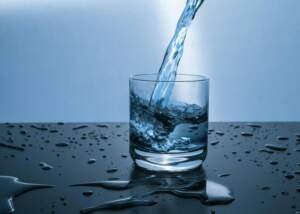
About 60% of the human body is made up of water, and drinking enough water supports healthy hydration, which helps prevent headaches, constipation, urinary tract infections, and kidney stones. You lose water throughout the day through urination, defecation and sweat.
Many factors can affect how much water you need per day, but women generally need about 11.5 cups of total fluid per day, while men need about 15.5 cups. However, foods provide about 20% of daily water needs, leaving 9 cups per day for women and 13 cups for men.
Exercise increases water demand above your normal baseline due to sweat loss and the need to regulate body temperature. Even mild dehydration (2% of body weight) can reduce concentration and alertness, increase fatigue and increase perceived exertion, which means it feels more difficult to keep going.10
Proper hydration also plays an important role in preventing and recovering from exercise-related injuries
Although individual needs may vary, a general recommendation is to drink 16-20 ounces (oz) of water four hours before exercise, 8-12 oz every 15 minutes during exercise, and 16-24 oz for every pound lost after a workout. .
If you engage in moderately intense exercise lasting an hour or less and are not in extreme heat or humidity, water should be adequate to maintain fluid balance.
Coconut water

Coconut water is the clear liquid found inside young coconuts. This drink is rich in carbohydrates and contains electrolytes like potassium, magnesium and sodium.
When you exercise, electrolytes are lost in sweat. Replacing these important minerals helps balance fluid levels in the body, stabilize blood pressure, support muscle and nerve function, and help stabilize heart rhythms.
Few studies have evaluated the effects of coconut water as a pre-exercise drink. A small study compared the effects of coconut water with a sports drink during endurance cycling in 15 men and four women. Athletic performance with coconut water was comparable to sports drinks. There were also no significant differences in measures of heart rate and sweat loss.
Like water, coconut water may be sufficient during moderate exercise of one hour or less in climate-controlled conditions when sweat loss is low. The sodium content in coconut water is generally lower than recommended post-workout. For example, one cup of unsweetened coconut water contains 63.7 milligrams (mg) of sodium. Experts recommend choosing a drink that contains 110 mg of sodium per 8 oz to reduce sodium sweat loss.
You can add coconut water to a salty pre-workout snack to increase your sodium intake. If your workouts are really sweaty sessions, long periods of time, or you sweat more than average, talk to your healthcare provider about the best way to supplement your fluid and electrolyte needs with sodium.
Coconut water also contains antioxidants, which can help neutralize compounds called reactive oxygen species (ROS) produced during long or intense workouts. ROS production can lead to tissue stress and damage.
The composition of coconut water products is not standardized, so the nutrition can vary considerably. Some supplements may contain added sodium, sugar, or fruit juice. Check the ingredient list for additional additives.
Sports Drinks
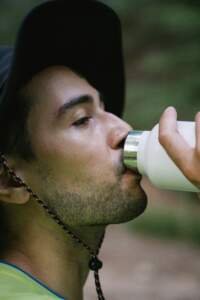
There are dozens of sports drinks on the market with numerous ingredients and formulations. Their primary role is to replenish fluid and electrolytes lost in sweat, including sodium, potassium, chloride, and magnesium.
A sports drink may also be sweetened with sugar or non-sugar sweeteners, including cane sugar, monk fruit, stevia, and artificial sweeteners.
Carbohydrates in the form of sugars are used in some sports drinks to provide a fuel source to power continued movement during longer-lasting or intense workouts. Small amounts of sugar can also boost fluid absorption from the gut into the bloodstream to better support hydration.
Consuming carbs rather than water alone can help preserve exercise intensity during workouts that last an hour or longer or are more strenuous. An intake of 30-60 grams (g) of carbs per hour has been shown to help maintain blood sugar levels and sustain athletic performance.
Excessive sodium and added sugar intake are linked to health risks. Centers for Disease Control and Prevention. Get the Facts: Added Sugars. However, the sodium and sugar combination may be beneficial in a sports drink to support hydration and fluid balance under certain circumstances, such as longer or more intense workouts and periods of sweat loss.
Coffee

About 75% of adults in the United States over the age of 20 drink coffee, and about half consume it daily. The drink has been linked to several health benefits, including reduced risk of disease, possibly linked to the antioxidant levels and anti-inflammatory effects of the coffee plant.
Coffee has also been shown to improve mood and support brain health, although its caffeine may increase anxiety in some people.
Drinking the right amount of coffee before exercise can improve athletic performance. Effects include improved reaction time and possibly increased strength and aerobic performance.
A typical pre-workout coffee protocol for athletes is 2-4 cups (about 16-32 oz) of brewed medium roast or reconstituted Arabica instant coffee. The final sip should be taken about an hour before exercise. Amounts vary based on individual sensitivity, body size and frequency of use.
This is equivalent to 3-6 mg of caffeine per kilogram (kg) of body weight. For example, this is 204-408 mg of caffeine for an adult weighing 150 pounds (68 kg). Despite coffee’s reputation as a diuretic (a substance that increases fluid loss), this amount of caffeine is not associated with dehydration during pre-exercise.
For adults without pre-existing conditions, experts recommend consuming no more than 400 mg of caffeine per day. Otherwise, you may experience side effects such as nausea, headache, upset stomach, rapid heartbeat, anxiety, and insomnia.
Green tea

Tea, including green tea, has been used medicinally in Japan and China for thousands of years. Green tea has been shown to possess anti-inflammatory, antiviral and antibacterial properties and is rich in polyphenol antioxidants. The latter is associated with improved cholesterol, blood pressure, blood sugar control and positive effects on gut bacteria leading to prevention of chronic disease.
Green tea can improve mental alertness. It is believed to promote weight loss, but research does not support this claim. Consuming up to 8 cups per day is considered safe.
Green tea has been shown to offset oxidative stress, an imbalance between the production of cell-damaging compounds called free radicals and the body’s ability to deal with their damage. Prolonged or intense exercise can trigger free radical production, which leads to oxidative stress and impairs athletic performance.
Several studies have shown that green tea protects against oxidative stress during and after exercise. It has also been found to increase fat burning during moderate-intensity activity.
An 8-ounce (oz) cup of green tea typically contains 30-50 milligrams of caffeine, less than coffee. However, green tea should not be combined with MIPS that contain excess caffeine or other stimulants.
Beetroot juice

Because of its research-backed effects, beetroot juice (the juice from beets) has become a recommended beverage to support athletic performance. Beetroot juice has been shown to increase levels of nitric oxide (NO), which increases blood flow, improves oxygen delivery and utilization, increases energy production, and strengthens muscle contraction.
A research review found that beetroot juice can improve cardio endurance and increase time to exhaustion, meaning an athlete can exercise longer at a certain intensity without needing to stop.
Another review found that consuming beetroot juice in a single dose or multiple doses over several days helped improve performance during intermittent, high-intensity training.
The effects of beetroot juice are seen about 150 minutes (2.5 hours) after consumption, so some experts recommend drinking it at least 90 minutes before exercise, depending on the length of your workout.
Its juice provides various minerals including potassium, calcium, magnesium, iron, zinc and manganese. In addition, beetroot has very high antioxidant activity – which may help protect against exercise-induced oxidative stress.
Beet juice can be made fresh, purchased ready-to-drink, combined with other juices, in concentrated shot form, or mixed with water as a powder.
If you are new to beetroot juice, start with a small portion to see how your body reacts. Drinking beetroot juice can cause your urine or stool to turn pink to deep red. If you are told to limit high oxalate foods or are at risk of kidney stones, avoid beets and beetroot juice. Using beetroot juice with caffeine also reduces its effectiveness.
Beet Juice Tip
The bacteria in the mouth play a role in converting the natural nitrates in beetroot juice into beneficial nitric oxide, so researchers recommend not using antibacterial mouthwash after drinking it to fully take advantage of the juice’s perks.
Tomato juice

One cup of 100% tomato juice is 95% water, provides only 41 calories and provides 170 mg of vitamin C, or 189% of the daily value. Vitamin C is needed for repair throughout the body. It helps build collagen to support skin, blood vessels, tendons and ligaments, and helps maintain bones and cartilage.
A study of middle-aged women found that consuming tomato juice increased calorie burning, reduced high triglyceride (blood fat) levels, and helped relieve menopausal symptoms, including anxiety.
In terms of exercise, a small study found that tomato juice as a pre-workout drink reduced post-exercise fatigue, which may reduce a common barrier to being active regularly.
Other studies have looked at consuming tomato juice during and after exercise. Scientists found that the juice reduced levels of creatinine phosphokinase and lactate dehydrogenase, markers of exercise-induced muscle damage. These compounds returned to near-normal levels, an effect that was not seen in the control group that did not drink tomato juice. C-reactive protein, a marker of inflammation, was also reduced in tomato juice drinkers.
However, in one study, men and women were asked to drink about 11 ounces of tomato juice, which is more than a normal portion (an individual can is usually 5.5 ounces). Also, tomato juice is not the best drink for everyone.
Tomato juice contains FODMAPs, specific carbohydrates that are not completely broken down and absorbed from the digestive tract into the bloodstream. It can cause gastrointestinal (GI) symptoms like bloating in some people, such as people with irritable bowel syndrome (IBS).
Tomato juice may increase gastroesophageal reflux (GERD), a condition in which stomach contents move up into the esophagus, leading to heartburn and discomfort.
Pomegranate juice

Pomegranate juice is rich in polyphenol antioxidants. Small preliminary studies have linked the juice to protection against obesity and heart disease, as well as healthy blood sugar control.
This drink provides anti-inflammatory and antioxidant benefits during and after exercise, improves cardio performance during exercise, and supports post-workout recovery. However, these studies were small and used higher serving sizes, about two or more cups per day.
Weight training studies have shown that consuming pomegranate juice several days before and one hour before exercise improves performance, reduces oxidative stress, and reduces pain. Other studies have demonstrated positive effects on muscle soreness and fatigue when eating pre-workout
Studies have used different amounts of pomegranate juice at different times, so the most effective dose is unknown. If you choose pomegranate juice pre-workout, keep in mind that one cup provides about 135 calories and is low in sodium, at just 22 milligrams per 8-oz serving.
Watermelon juice
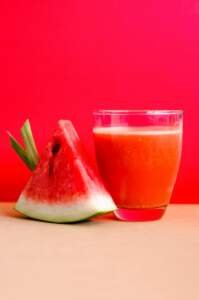
Eating watermelon can contribute to the quality of your overall diet, increasing your intake of magnesium, potassium, vitamin A and certain antioxidants such as lycopene, beta-carotene, lutein and zeaxanthin.
As a juice, drinking about 16 ounces an hour before exercise can reduce muscle soreness. However, the results of studies on the effectiveness of watermelon juice and exercise are mixed with some data showing no effect on endurance.
Watermelon juice is also a high FODMAP food. For people who are not sensitive to high-FODMAP foods, this can be a refreshing, hydrating drink because it is 91% water. An 8-oz portion provides about 20 mg of vitamin C (about 20% of the daily value) and only 70 calories.
Ginger shot

Ginger shots have grown in popularity, now available in health food stores, supermarkets, and retail outlets. Ginger, an herb, is recognized for its natural anti-inflammatory, antioxidant, antibacterial and antiviral properties.
Ginger has also been studied as a potential pre-workout aid. In one study, 36 women were divided into three groups. One group ate ginger an hour before exercise, another ate ginger immediately after exercise, and a third received a placebo.
Research indicates that 2 grams of dried ginger powder before a workout can reduce post-exercise inflammation and soreness and relieve symptoms of delayed onset muscle soreness (DOMS), which include inflammation, soreness and swelling and reduced mobility.
However, the ginger content in commercial shots and drinks varies, so these products may not provide the benefits seen in studies. Ginger can cause side effects such as digestive discomfort, heartburn, diarrhea, and mouth or throat irritation, especially at high doses. Consuming more than 6 grams of ginger root per day may cause side effects.
Consult your healthcare provider to determine if ginger is right for you, for pre-workout use or otherwise. If taking a small shot before exercise, usually about 2 ounces, be sure to hydrate well with water.
Review
There are many pre-workout drinks to choose from with varying levels of nutrients, calories and research-backed benefits related to physical activity and health. Water is the ultimate drink, but water alone is not enough to adequately replace electrolytes before, during, and after a sweaty workout.
Some functional beverages beyond water can positively affect exercise performance and recovery. These include coconut water, beet juice, tomato juice and more. However, this drink is not the best for everyone. Talk to your healthcare provider for personalized guidance based on your medical history and goals.

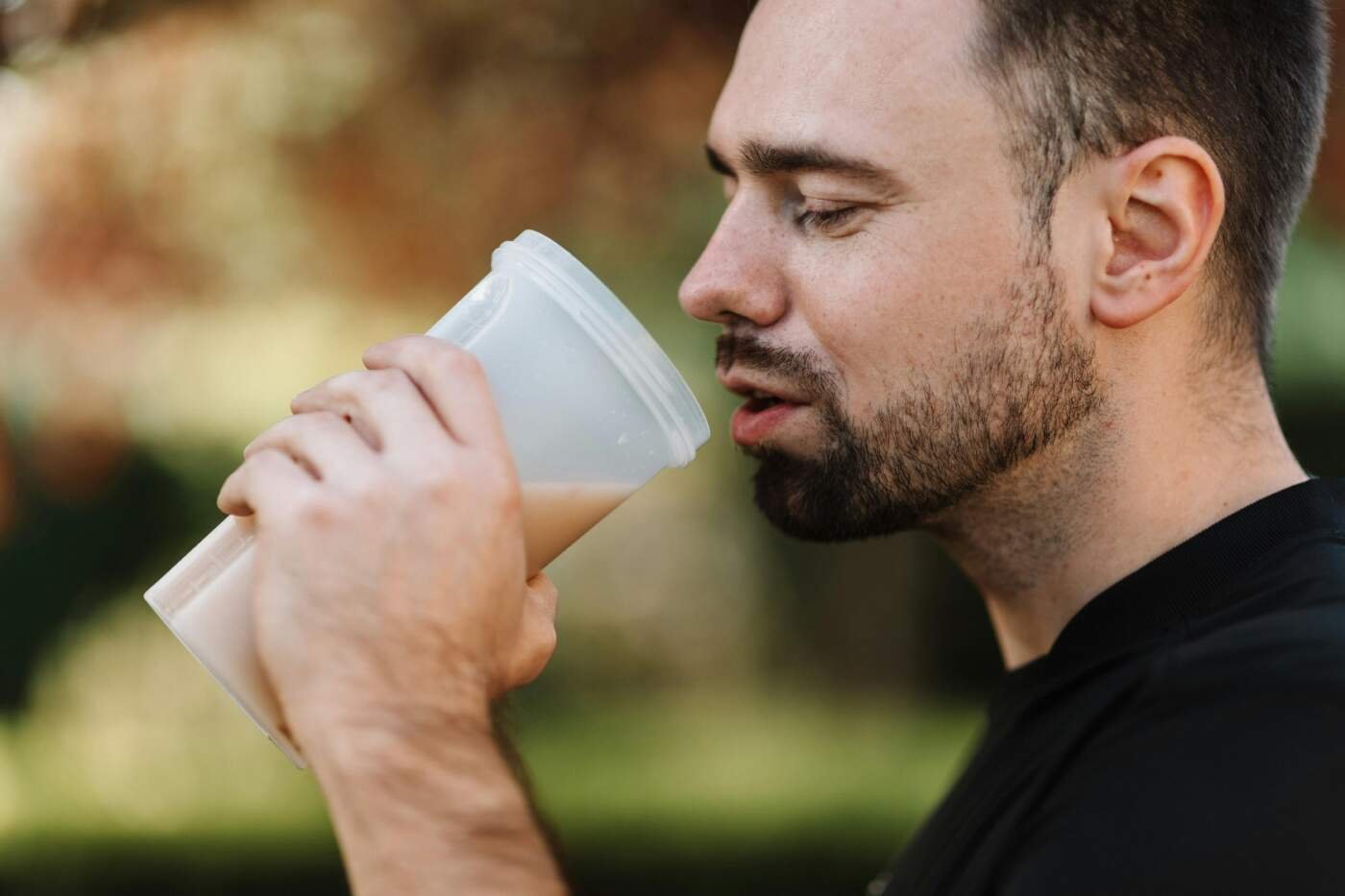
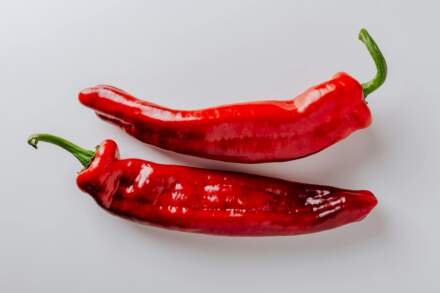
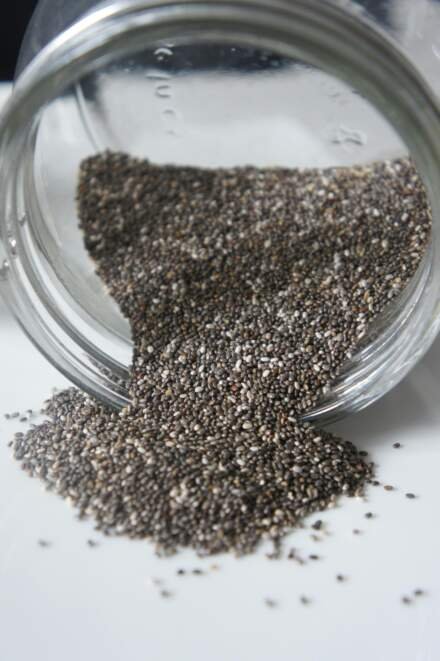
Leave a Comment